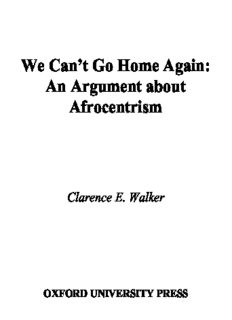
We Can't Go Home Again: An Argument about Afrocentrism PDF
Preview We Can't Go Home Again: An Argument about Afrocentrism
We Can’t Go Home Again: An Argument about Afrocentrism Clarence E. Walker OXFORD UNIVERSITY PRESS We Can’t Go Home Again This page intentionally left blank We Can’t Go Home Again AN ARGUMENT ABOUT AFROCENTRISM Clarence E. Walker 1 2001 3 Oxford New York Athens Auckland Bangkok Bogotá Buenos Aires Calcutta Cape Town Chennai Dar es Salaam Delhi Florence Hong Kong Istanbul Karachi Kuala Lumpur Madrid Melbourne Mexico City Mumbai Nairobi Paris São Paulo Shanghai Singapore Taipei Tokyo Toronto Warsaw and associated companies in Berlin Ibadan Copyright © 2001 by Clarence E. Walker Published by Oxford University Press, Inc. 198 Madison Avenue, New York, New York 10016 Oxford is a registered trademark of Oxford University Press All rights reserved. No part of this publication may be reproduced, stored in a retrieval system, or transmitted, in any form or by any means, electronic, mechanical, photocopying, recording, or otherwise, without the prior permission of Oxford University Press. Library of Congress Cataloging-in-Publication Data is available isbn0-19-509571-5 Book design & composition by Mark McGarry Set in the Scala family of types 9 8 7 6 5 4 3 2 1 Printed in the United States of America on acid-free paper For Paul Goodman, professor of history, and Jacquelyn Mitchell, director of African-American studies This page intentionally left blank Men make their own history, but they do not make it just as they please; they do not make it under circumstances chosen by them- selves, but under circumstances directly encountered, given, and transmitted from the past. The tradition of all the dead generations weighs like a nightmare on the brain of the living. And just when they seem engaged in revolutionizing themselves and things, in creating something that has never yet existed, precisely in such periods of revolutionary crisis they anxiously conjure up the spirits of the past to their service and borrow from them names, battle cries, and costumes in order to present the new scene of world his- tory in this time-honored disguise and this borrowed language.” Karl Marx, the eighteenth brumaireof Louis Bonaparte . . . when you give Negroes the facts in their case, they call for flat- tery and misinformation. Carter G. Woodson When all men think alike, no one thinks very much. Walter Lippman This page intentionally left blank CONTENTS Acknowledgments xi Note on Usage xv Introduction xvii part one If Everybody Was a King, Who Built the Pyramids? Afrocentrism and Black American History 1 part two “All God’s Dangers Ain’t a White Man,” or “Not All Knowledge Is Power” 83 Notes 133 Index 165
Description: